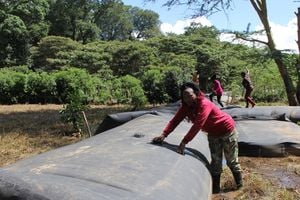The bitter legacy of Grogan

Grogan bought a huge chunk of the area between what are now Kirinyaga Road and River Road (but still informally known as Grogan) for just 100 pounds. Photo/FILE
Ewart Grogan, the man whose name is attached to the plot at the centre of a bitter ownership battle in downtown Nairobi, was one of the most colourful characters in colonial Kenya. He claimed to have been the first man to walk the length of the African continent from the Cape of Good Hope to Cairo.
He was also, alongside fellow Briton Hugh Cholmondeley (the third Baron Delamere), a leader of the local settler government and opponent of calls from early nationalists for internal self-government.
Attract attention
Born in 1874, Grogan learnt the need to attract attention at an early age. He was the first born of 21 children and, his biographer notes, “his father had the greatest difficulty remembering the names of his offspring ... he would often greet a passing child with a pat on the head and a friendly ‘how’s Margaret today?’, only to find he was unknowingly addressing Dorothy”.
Grogan dropped out of Cambridge University to fight on the British side in Zimbabwe’s first war of independence in 1896. He served with another imperialist, Cecil Rhodes. Grogan later travelled to New Zealand where he met and fell in love with his future wife Gertrude Watt.
His attempts to seek her hand in marriage were met with an unexpected obstacle: her stepfather was unimpressed with his credentials and demanded that he do something to prove his mettle. This launched Grogan on the Cape to Cairo journey that would win him fame before he returned from a triumphant sojourn in Britain to set up base in Nairobi.
Grogan bought a huge chunk of the area between what are now Kirinyaga Road and River Road (but still informally known as Grogan) for just 100 pounds. He judged, correctly, that the centre of the future Nairobi city would be near the plot, adjacent to the Nairobi River.
Most successful
The settler soon established himself as one of the colony’s most successful entrepreneurs although it was for what became known as the “Nairobi Incident” that he earned the greatest infamy. The incident is described in Lost Lion of Empire: The Life of Cape to Cairo Grogan by journalist Edward Paice as stemming from an accusation by his sister, Dorothy, that three hand-cart pullers had behaved disrespectfully toward her.
Grogan concluded the trio was guilty of “insolent conduct” and decided to make an example of them. He found them at their work station, tied their hands behind their backs and frogmarched them to the front gate of what is today the High Court grounds.
Attempts by a white policeman to stop him were met with the declaration that he would beat his servants “because I want to”. Before a crowd of hundreds of cheering settlers, Grogan flogged one of the cart pullers 25 times; the others were also caned.
The affair caused embarrassment to the colonial government, which claimed to have a judicial system capable of dealing with “insults from natives”. A young Winston Churchill, then an official in the Colonial Office, condemned Grogan’s action in the British Parliament. Grogan and five accomplices were arrested and jailed in comfortable conditions in a government bungalow.
“There,” writes Mr Paice, “they had meals brought in from the Nairobi and Travellers clubs, the town band turned out to play outside Grogan’s window at dinner times, and a medical officer visited each day ... The whole thing, observed (the) police chief ... became a standing joke.”
Violent temper
Grogan and settlers like Cholmondeley (described as having a “very quick and often violent temper” and being an expert marksman) are credited with setting up commercial agriculture in Kenya and helping develop infrastructure. But the persistence of land disputes is a major part of their legacy.
They appropriated huge parcels of land (Delamere settled on a 100,000-acre ranch in Molo while Grogan claimed a 25,000-acre holding at Mau Summit). In the process, they displaced thousands of Africans. The failure of post-colonial administrations to resolve the disputes and resentments carried over from those days remains one of the biggest challenges in dealing with land disputes in modern-day Kenya.




